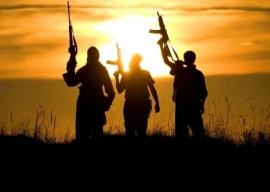
Women make up less than 1% of the total police force, even though a quota of 10% is reserved for them, according to a recent report.
Commonwealth Human Rights Initiative (CHRI)’s report titled Rough Roads to Equality: Women Police in South Asia August, 2015, the number of female police officers in the country is just over 4,000 or 0.94% of the total police force of over 425,000.
The situation in Balochistan is the worst, with only103 female officers out of a total strength of 32,937 -- less than one third of a per cent.
Read: 504 women constables complete training
The situation in other provinces and departments are hardly better. In Punjab and Sindh, the number of female officers is 1,798 of a total of 149,719 (1.2%) and 902 of a total of 147,782 (0.61%), respectively. In K-P, the number of serving female police officers is just 438.
However, the situation is slightly better in Islamabad and Gilgit-Baltistan but not satisfactory. The percentage of female officers’ enrolment in the police force in the federal capital and G-B is 1.55% and 3.01%, respectively.
Of all the provincial and federal police departments, only the Federal Investigation Agency (FIA) is almost implementing the government’s order of reserving 10% seats for women, with 150 female officers, approximately 9.68% of the total force.
Read: Pakistan’s female commandos: On the front line
Further, women on higher posts in police is also a scarcity, with only one serving as female senior superintendent of police, 19 superintendents of police and three assistant superintendents.

Factors behind low enrolment of women
According to the report, the garishly low number of women officers in the country can be attributed to the overall patriarchal mentality of society and the disconnect between a stated desire to have more women involved in policing and the ground situation.
Citing the “Women Police as Change Agents” report published in 2013, CHRI said while an overwhelming majority of male police officers believe women should join the police force and also recognised that there is need to increase the number of women in the police. However, only 46% of them said they would encourage a female member of their family to join the service. Although the majority (approximately 75%) of the respondents did not declare an unwillingness to work alongside or even under women officers, a significant 25% of those surveyed expressed reservations.
Harassment at the workplace is another reason behind the low enrolment rate of women in the police force.
During the surveys conducted in 2013, out of the 17% of respondents who spoke about harassment at the workplace, only about half of them had the courage to complain.
Only 29% of the complaints lodged were addressed by the authority.
While some who chose not to lodge a complaint feared reprisals, others feared non-cooperation by superiors.
The report further stated that despite the promulgation of the Protection Against Harassment of Women at the Workplace Act, 2010, some victims claimed that there was no mechanism in place to register a complaint.

Deployment and allocation of duties
While the overall security situation of the country has had an impact on the deployment of women to certain postings, the report also found that some women officers prefer desk jobs over field postings.
The report further claimed that only 42% of those surveyed were of the opinion that women should perform duties in remote areas, while 63% thought women should not be assigned duties in violence-prone areas.
The survey showed some conflicting views on the deployment and allocation of duties to women police officers, with 72% of respondents saying female police officers should be placed alongside their male counterparts. However, in response to a separate question, “45% believed that women police officers should be assigned cases and crimes specific to women and should handle only women offenders”.
It was also revealed during research that policewomen below an officer’s rank were not issued weapons, while men of the same rank were.
Read: Sindh’s first female SHO takes charge of Clifton Police Station
There have, however, been some positive developments lately. In April 2014, Syeda Ghazala was appointed as the first female Station House Officer (SHO) in Sindh. She was appointed SHO of the Clifton neighbourhood. Despite her 10 year-experience of serving at a women’s police station, Ghazala said after joining a mainstream police station, she realised she was very inexperienced in basic policing duties like responding to rescue calls and securing a crime scene. She was able to build these skills only by working in the mainstream police station.


1719660634-1/BeFunky-collage-nicole-(1)1719660634-1-165x106.webp)

1732276540-0/kim-(10)1732276540-0-165x106.webp)


1724249382-0/Untitled-(640-x-480-px)1724249382-0-270x192.webp)


1732270499-0/Express-Tribune-(7)1732270499-0-270x192.webp)






COMMENTS (2)
Comments are moderated and generally will be posted if they are on-topic and not abusive.
For more information, please see our Comments FAQ